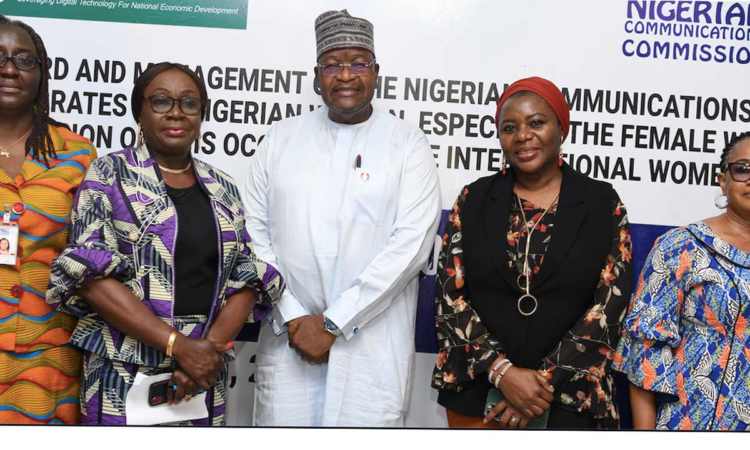
Deputy Director, Financial Services, Stella Erebor (left); Head, Corporate Communications, Nnena Ukoha; Executive Vice Chairman/Chief Executive Officer, Prof. Umar Garba Danbatta; Head, Human Capital, Hafsat Lawal, and Head, Telecom Laws and Regulation, all of the Nigerian Communications Commission, Helen Obi, during the 2023 International Women’s Day Celebration at the NCC Head Office in Abuja. PHOTO CREDIT: NCC
Today, technology plays a key role in driving innovations and setting the pace across sectors in the economy. The male dominance in the tech space is abysmally visible and there is need for inclusivity.
Hence, to celebrate this year’s International Women’s Day, the United Nations in its call to #Embrace Equity, came out with the theme, ‘Innovation and Technology for Gender Equality’.
In Nigeria, technology is estimated to contribute about 20.32 per cent to the annual GDP (as of Q3 2022). Yet, the number of women who are working in, building, innovating and even using technology continues to trail behind that of men.
Figures from the National Bureau of Statistics (NBS) showed that women constitute only 22 per cent of the engineering and technology graduates from Nigerian universities. The number is equally low in the workplace and research reveals many women are dropping out of technology careers.
According to Executive Director, Women’s Technology Empowerment Centre (W.TEC), Oreoluwa Somolu Lesi, the poor participation of female in the technology sector is not peculiar to Nigeria. The story is not radically different in other parts of the world.
“Women make-up only 35 per cent of students of STEM disciplines across the world at the tertiary level and 20 per cent of the global STEM workforce. However, research and anecdotal evidence seem to indicate that when women embrace technology, they prioritise leveraging it for making connections, building community and helping others. In Nigeria, according to DataReportal, in 2022, 44.7 per cent of Nigeria’s social media users were female, which is almost at par with men.
“We have seen this across our programmes at W.TEC. In the MakeHerSpace programme, which teaches digital electronics to girls and young women in over 21 centres across five Nigerian states, we have seen the beneficiaries building power banks, solar-powered fans and other devices that are meeting a real need in their communities,” she noted.
On the challenges confronting women and girls, Lesi said: “There have been historical reasons for the lower number of women who use technology, which range from stereotypes about technology being more appropriate for men, lack of access, cost of the devices, and lack of time. Women, with the multiple balls we traditionally juggle, have little time to waste and so there is the constant weighing of the opportunity cost of carving out time from an overloaded schedule for technology.
“However, as technology has become more ubiquitous and intersecting with virtually every aspect of our lives, its relevance has become more obvious and this in turn has encouraged more women to embrace tech. In W.TEC’s She Can with ICT programme, which helps micro to small scale female entrepreneurs catalyse their business growth and scale-up their operations, we have observed the enthusiasm with which the participants adopt technology and explore ways to integrate them meaningfully into their businesses. As a result, they are upping their productivity, income and the number of jobs they are able to create.”
Transformational coach and founder, Immerse Coaching Company, Debola Deji-Kurunmi noted that with the aid of an ed-tech platform that serves primarily as the central point for its coaching programmes and courses, members take on the journey to personal transformation.
According to her, some of the recurring challenges that are faced by the company when it comes to being able to onboard its members, sustain their engagement and ensure they continue to grow their participation is tech anxiety. “There are many women who have an initial tech anxiety where if you tell them to meet up for a physical event, it is likely easier than when you say everything is happening on a tech platform. That recognition that about 60 per cent of new entrants into our membership often struggle with tech anxiety also informs how we set up our support structure, like the way we create customer happiness, and the way we curate an experience for them to be a part of the community successfully.”
Deji-Kurunmi stressed the need for women to be able to balance the many demands in their lives. “If a woman doesn’t have an agile and elegant system of balancing the different roles that she plays, she may not be able to devout herself to cutting-edge coaching that can move her to a different level of growth in the career, business, finance and health. So, many times, women want to grow but then they are unable to sustain commitments because they are busting at the scenes of overwhelming degrees of commitment.”
Leadership development expert and founder, LeaderX app, Kemi Ogunkoya said: “As an ed-tech founder, technology is absolutely critical to our entire business, in fact, it is the life blood of our business. Our entire business model is based on leveraging technology to deliver top-notch leadership development intervention to our users. As a business, we identified the top challenges individuals and organisations face when it comes to leadership development, which includes, time, finance, accessibility, and sustenance with technology.
We were able to build a mobile application that addresses these challenges, giving users access to transformative leadership development interventions anytime, anywhere, and making it easier for them to fit their personal development journey into their busy schedules.
“Through technology, we are able to solve our customers’ pain points and exceed their expectations, manage our remote team, scale our business, analyze customer behaviours, and make a significant change in the world.”
Financial inclusion advocate and founder of Herconomy, Ifedayo Durosinmi-Etti, with her women-focused finance platform started out as a community before pivoting to financial services. Hence it has garnered trust from women, which is necessary for the inclusion process.
She noted that to ensure that more women embrace technology to drive their finances, education is key. “I realise that some women make more money than men but when it comes to retirement, the men have more money, the difference is education. Hence, we ensure that we hold capacity building workshops from time to time to educate women on the essence of financial security.”
For founder, HerVest and financial feminist, Solape Akinpelu, technology has always been playing a pivotal role in developing, upscaling, and out-scaling startups like HerVest. “At HerVest, technology development is becoming increasingly important, as it has the potential to significantly increase the chances of success. As more and more businesses enter the digital world, the need for innovative and effective technology solutions is becoming essential for any startup to succeed.
“We just released HerVest 2.0 and it is in the quest to offer more value to our women. When I say our women, we are not only talking about the executive or tech-savvy girl in the heart of Lagos, I am also referring to the rural women who live somewhere in Ilorin. The use of technology cannot be underestimated because we cannot create solutions without the use of technology. There is no HerVest without tech and no support for our women without efficiently leveraging new technologies to test our new ideas.”
On the challenges women encounter embracing tech, Akinpelu said: “Women face substantial obstacles. In contrast to males, challenges for women in technology are common occurrences. These women sometimes work twice as hard and face several obstacles. Last year at Women in Tech Global Movement- Nigeria Chapter, we had a programme called Makeathon with the aim to upskill 1000 girls/women across Nigeria. We realised that some of the girls dropped out or couldn’t finish the application process, and to encourage them, we had to have webinars explaining the courses and breaking them down for them to comprehend.”
She further noted that women become Impostor Syndrome Victims, which is the constant unwillingness to accept that one’s accomplishment is really the result of one’s own abilities and dedication. “Impostor syndrome increases the likelihood of anxiousness and causes additional issues with the task that is done. We just sometimes think we are a fraud, which is a lie. We need to own our journey as well as our achievements.”
She added that inadequate representation in tech and lack of role models could sometimes cause a person to feel alone and discouraged. This gives the belief that one doesn’t belong or is incapable of succeeding when you don’t see someone relatable in a leadership role. “That is why we launched the Mentor-Me programme because we need representatives. We need women who are already on the table and can create seats for our girls on the table. We need advocates and not just bench-warmers.”
IWD Message:
For Ogunkoya, celebrating International Women’s Day is reflecting on the progress made towards achieving gender equity, especially in these uncertain times of economic challenges. “I want to encourage women to continue to pursue their dreams, remain resilient and continue to push forward and strive for a better future even in the face of uncertainties. Never forget that we have the power to effect change and to make a difference in our communities and in the world. Let us continue to challenge stereotypes, break down barriers, and strive for a more equitable and just society, not just for ourselves, but also for the future generations of women who will follow in our footsteps.
“As women, let’s keep supporting each other. We are stronger together, and by working collaboratively and supporting one another, we can break down barriers, create prosperity, thrive together, and create a more equitable world.”
Deji-Kurunmi said: “One of the things I find about IWD and women’s month is that it has pressure it unconsciously vibes to women – rewards, awards, announcements – and all those coming through and you could feel a counterproductive sense of unaccomplished goals. And because I am coaching female leaders, they have this sense of ‘I am doing enough’, ‘ I am measuring up’ or ‘ I am making a difference’. It is a lot and you have to practise governance with intention, know what you are and willing to take in, be clear on our mission, pursue your journey with focus and create a system that nurtures you in your own world. So, if you ever feel like you are out of resource, you have a place to go back into and restore your conviction and sense of leaning.”
She added that with technology, one does not always have to build from the scratch. “I built a learning product from the scratch, it took 18 months, a lot of money and it failed woefully. So, I ditched it and we are back in the building process. My point is, you don’t always have to build, just be outcome-oriented and be clear about what you want, where you want to go, the people you want to reach and the value you want to create. The answers to these will shape your determination about the type of technology you need.”
For Lesi, the last few years have been rough for most people, by any standards, but in the middle of it lay many opportunities for those who can spot them. “I would encourage women to keep learning all they can in their respective areas of work or business, so that they stand out from the crowd. Technology can bring great opportunities when paired with other skills, so I would also encourage women to have an open mind about learning about tech. It’s easy to feel overwhelmed or mystified by all the latest trends, but remember that you should not think about jumping on every trend you learn about. You should rather seek to understand it better through reading, courses, online tutorials, talking with friends or podcasts and try to have fun with it.”
Akinpelu said: “Don’t allow fear to hold you back. Don’t let circumstances dictate your outcome. Don’t give in to excuses and not show up. Forge ahead. I’m not saying it will be a walk in the park but persevere. Hold other women’s hands as you go. Embrace challenges, opportunities, and redirections. They will deepen your root and make you fierce. Also, always show up. Be consistent and vocal about what and who you are. Do it unapologetically.”
In her message to women, Durosinmi-Etti said being fair always would stand them in good stead.
“Women deserve to be treated fairly at the work place, in their personal lives and with any decisions they make. In our society, we are making changes daily to see that women are treated fairly and I am proud to be championing this with the Herconomy community. Women shouldn’t feel pressured; it is okay to be confused and not clear about the direction you want to take, so it is important to do it afraid. Continue building, learning and being a person of value and gradually you will find things fall in place,” she advised
You must be logged in to post a comment.
Why are you flagging this comment?
I disagree with this user
Targeted harassment – posted harassing comments or discussions targeting me, or encouraged others to do so
Spam – posted spam comments or discussions
Inappropriate profile – profile contains inappropriate images or text
Threatening content – posted directly threatening content
Private information – posted someone else’s personally identifiable information
Before flagging, please keep in mind that Disqus does not moderate communities. Your username will be shown to the moderator, so you should only flag this comment for one of the reasons listed above.
We will review and take appropriate action.
Get the latest news delivered straight to your inbox every day of the week. Stay informed with the Guardian’s leading coverage of Nigerian and world news, business, technology and sports.
Follow Us







